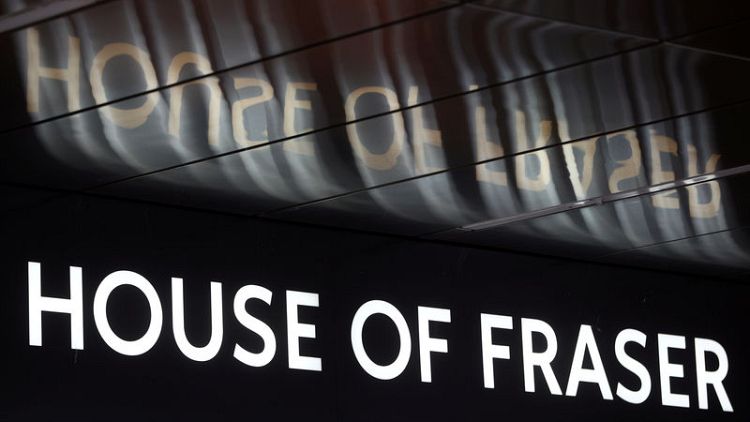LONDON (Reuters) - The purchase by Sports Direct <SPD.L> of department store group House of Fraser drew a cautious response from analysts on Monday, with some saying the deal could backfire on Mike Ashley, the sportswear retailer's founder and chief executive.
Ashley, who also owns English Premier League soccer club Newcastle United, on Friday snapped up the 169-year-old House of Fraser's 58 UK stores, its brand and its stock for 90 million pounds hours after it collapsed into administration.
He has given away little about his plans for the company, beyond stating that he would keep as many stores open as possible and transform the chain "into the Harrods of the High Street" - a reference to the Qatari-owned luxury department store in London that was once owned by House of Fraser.
Shares in Sports Direct were down 1.7 percent at 1015 GMT on Monday, reflecting concerns about the wisdom of the acquisition given Ashley's disastrous investment in rival department store group Debenhams <DEB.L>. Sports Direct last month booked an 85 million pound charge on that investment.
"It is far from clear if he really knows what he has taken on," said independent retail analyst Nick Bubb.
"Our first reaction was that 90 million pounds was quite a lot to pay for the business, even debt-free, given that it is heading for a loss of over 50 million pounds on gross sales of 1.1 billion pounds this year and restructuring will cost a lot of money," he said.
TROUBLE ON THE HIGH STREET
A string of UK store groups have gone out of business or announced shop closures this year as rising labour costs, higher business property taxes and growing online competition coincide with subdued customer spending, with department stores particularly hard hit.
Apart from the rapid decline of House of Fraser, Bhs went bust in 2016, Debenhams has slashed profit forecasts three times this year and Marks & Spencer <MKS.L> is planning to close 100 UK shops by 2022.
Even John Lewis, which has long outperformed its rivals, in June warned of a big fall in annual profit..
Analysts at Peel Hunt said the House of Fraser purchase and Sports Direct's 29.7 percent holding in Debenhams "clearly suggests that his (Ashley's) thermometer on the wellbeing of the department store sector is giving a different reading to many other watchers."
Other analysts have speculated that Ashley could use his Debenhams stake to push for a merger with that business. Shares in Debenhams were up 5.6 percent, building on Friday's gains.
STORE SALES
Bubb said he suspected that Ashley, who owns 61 percent of Sports Direct, will end up selling a handful of House of Fraser's best stores, possibly to John Lewis or Selfridges, dump the worst stores and try to keep the rump as an upmarket trophy to impress key suppliers Nike <NKE.N> and Adidas <ADSGn.DE>.
The Peel Hunt analysts however lamented Ashley's lack of engagement with the investment community.
"What a shame Sports Direct refuses to engage with City analysts. The House of Fraser deal is fascinating but the lack of any shared strategic plan for the stores means that we can't embrace management's excitement with the deal," they said.
They also expressed concern about Sports Direct's rising debt -- net debt was 397 million pounds as of April 29 -- and growing pressure on management time given the group's vast array of investments.
(Reporting by James Davey; Editing by Kirsten Donovan)



